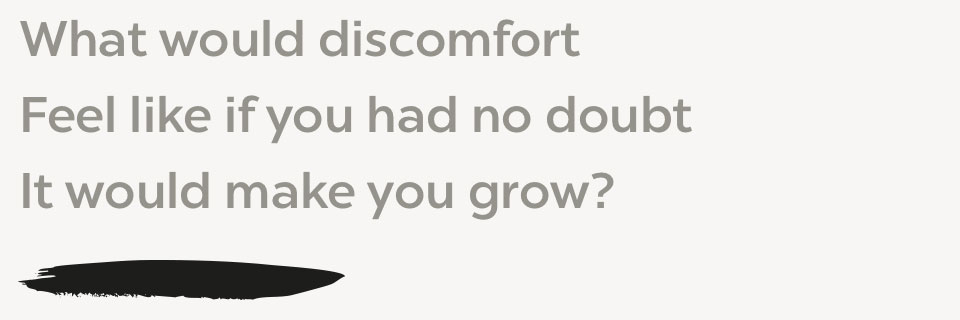Last week, we talked about the larger lesson and how your relationship to fear and discomfort is the answer to achieving greatness.
Let me repeat.
Your relationship to fear and discomfort is the answer.
In other words, whatever you’re doing, whatever project, initiative, business, partnership, etc. Whatever it is, greatness only happens when you want it badly enough that you’re willing and able to push through the fear.
If I could go back in time and talk to the fourteen-year-old Josef who was just starting to dive from 10m tower, it would have gone like this:
Me now: “It’s getting pretty scary, huh?”
Me then: “It sure is.”
“Is it worth it?”
“I don’t know.”
“What do you want? Do you want to be a great diver?”
“I think so but I don’t like the pain and the fear.”
“And what if I said you can’t have one without the other?”
“Then I’d say it’s not worth it.”
“Okay, then, I respect that. These people around you: your parents, your coaches, your peers. They think you can be great, and they think you’re willing to do whatever it takes. If you’re not, it’s okay, but right now, you’re living an inside life and an outside life that don’t match. How is that for you?”
“I hate it.”
“Good, that’s your integrity. So, choose to face the fear, or choose not to. Either way is fine, but be whole. Have the integrity to stand entirely for what you want. And if people don’t accept your choice, screw them.”
Sometimes the discomfort is not worth it. The relationship is not worth fighting for, the job is not worth the oppressive boss, the challenges of being a business owner not worth the stress. Only you can decide that. What you cannot decide is what that discomfort is. Everything comes with a price, and the greater the prize, the greater the price. In a world where most people look for instant gratification, quick-fixes, and free lunches, this is not a popular viewpoint. It’s also the cause of epidemic mediocrity.
Other times, the discomfort is worth it. Again, only you can decide this. This is the choice. Where people get confused, however, is where they negotiate with the discomfort itself. Whatever kind of success you seek but have not yet realized, there is an uncomfortable price you’ve not yet paid. I’ll say it again:
Whatever kind of success you seek but have not yet realized, there is an uncomfortable price you’ve not yet paid.
Desire to know what that price is.
If you don’t know what it is, you’re wasting time. Find out, as soon as you possibly can.
Then you can decide if it’s worth it and either work on it directly or pursue something else.
But if you desire to realize the success without identifying and paying the price, you will suffer. You will waste time looking for shortcuts. You will feel lost, hurt yourself and others through lack of follow-through, squander resources going the long way around your discomfort. Eventually, when you’ve tried everything to avoid it, when you’re finally ready to be brave, you will face it head-on. And if you waited too long, you may be too old and tired to have the energy, and you’ll tell yourself something like, “Most dreams never come true.”
And you’ll be right, because most people aren’t willing to pay the price.
The odds are you’re not a springboard diver, so how does discomfort show up for you?
Fear of hurting others, and people not liking you.
Fear of aloneness, separation.
Fear of loss of freedom, autonomy.
Fear that when you get what you want, you won’t be satisfied.
Fear of failure, that you can’t do it.
Fear of discovering that you’re not who you think you are.
Fear of change, such as where you live, the people in your life, your routines, etc.
And many more…
When you identify what fear is in the way of your greatness, it doesn’t just magically disappear. In fact, things may get even more uncomfortable. When people are near but not yet dealing with a fear directly, they experience secondary stress symptoms.
Symptoms you may experience when you approach these fears include anxiety, nausea, sweating, muscle tension, insomnia, headaches, aches and pains, lethargy, incessant worry, irritability, overwhelm, depression, shame, isolation, inability to focus, loss of appetite, and on and on.
Most people will do whatever they possibly can to avoid these symptoms. The multi-billion-dollar pharmaceutical industry is proof of this.
Do you have the courage and fortitude to purposefully subject yourself to these sensations in order to prove that your fear is not based on reality?
This is the difference between ordinary and extraordinary. A weak person reflexively seeks to alleviate symptoms. A strong one asks themselves if what they’re feeling is a reasonable price to pay, and if it is, they keep going.
You already have done this in your life and it worked.
You already know this.
The question is where are you pretending you don’t?
Someone once said, “A coach is someone who helps you do what you don’t want to do so you get what you want.” Implicit in this is that your coach helps you identify discomfort that is useful and necessary to feel, on the way to your goal. In other words, they say things like…
“You can get out when you puke.”
The answer to all of these fears—and achieving greatness—is to take them with you.
P.S. Forget everything you know about management. Why? How to Manage and Be Managed starts January 11th. Click here for more information.


